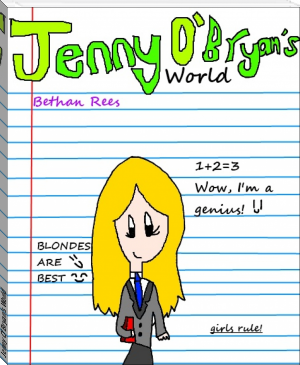The History and Records of the Elephant Club by Doesticks and Underhill (android based ebook reader TXT) 📗

- Author: Doesticks and Underhill
Book online «The History and Records of the Elephant Club by Doesticks and Underhill (android based ebook reader TXT) 📗». Author Doesticks and Underhill
At night they went immediately to bed, only finding their own rooms after poking their heads into[Pg 125] every other apartment on the same floor, and eventually securing the services of the chambermaid as a guide.
Overdale having got this lady to light his gas, was not able to get to bed without doing something further extraordinary, so wishing to open his window, he called a boy to his door twenty-seven times, by pulling at the bell-rope, which he imagined to be connected, in some inexplicable manner, with the sash. He was at last ready to go to sleep, when he blew out his gas, and laid down on the carpet, covering himself with the hearth-rug, fearing to get into the bed lest he should rumple the sheets. He woke up subsequently, and yelled for a waiter. One happened to be passing in the hall at that moment, and answered his call. Overdale asked where the tavern-keeper was, as he wanted too see him. He didn't want to be imposed upon, if he was from the country, and considered it a huge imposition to put a man into a room which was right over an asaf[oe]tida factory. The waiter comprehended the nature of Mr. Overdale's difficulty, and explained to him the nature of carburetted hydrogen, and the mistake that he had made in blowing out the light, instead of turning off the gas. Mr. Overdale thanked the waiter for his valuable information, and after waiting for the[Pg 126] room to be well ventilated, he retired to rest—this time, however, in the bed, the waiter having kindly explained to him that the bed-clothing was nicely adjusted for the express purpose of being rumpled up, in order to give employment to a useful class of the community known as chambermaids.
In the morning, by one of those curious coincidences which we know do happen, but for which we cannot account, our three rural friends found themselves, at precisely eight o'clock, in the bar-room, before the bar, and calling upon the major for something to drink. Each drank, after which they went in to breakfast.
The bill of fare not being so complicated as the one on the dinner-table the day previous, and being printed in good readable English, they had no difficulty in procuring breakfast entirely to their satisfaction. After arising, and supplying themselves with cigars, they started out on an exploring expedition through the city.
Overdale, having read a good deal about the various "lions" of the town, assumed to know all about it, and therefore Dennis and Wagstaff acquiesced in his taking the lead; Wagstaff taking notes of everything for the benefit of his children when he returned home.[Pg 127]
They strayed into Taylor's saloon, which Overdale informed them was the Crystal Palace. Gurney's Daguerreotype Gallery he stated was the American Art Union. The three then took the cars on the corner of Canal street and Broadway, Overdale remarking that he hoped all their lives were insured, as they were now on the Camden and Amboy Railroad. Dennis hoped they would run off the track in such a way that his wooden leg would be again broken. He would then retire for a few weeks, swear that he had lost a leg by the accident, sue the company for fifty thousand dollars damages, compromise by accepting ten thousand, and then go to Kansas and set up a faro bank. As they passed the Jefferson Market fire-alarm bell-tower, Overdale said it was a shot tower, erected in revolutionary times. They then arrived at the real Crystal Palace, which Overdale declared answered to the descriptions he had read of Fulton Market. The submarine armor which was on exhibition, he explained was a flying machine. The statue of the Amazon was noted down in Wagstaff's book, upon the authority of Overdale, as a cast-iron black foot squaw, on a prairie mustang. The fountain was announced to be a patent frog-pond. After writing down an accurate description of the fire-engines and hose-carts (the[Pg 128] first of which Overdale supposed to be perpetual self-acting locomotives, and the second a newly-invented threshing machine), Wagstaff proposed they should leave. The Croton Reservoir, Overdale stated was the gas-works. They then ascended the Latting Observatory, which their intelligent informant assured them was Trinity Church. From the altitude they here attained, they were favored with a view of a large extent of country. Overdale called the attention of his companions to the High Bridge over the Harlem river, of which they had an excellent view. He said that it was one of the few gigantic relics of the architecture of the Norsemen, whom he stated populated this country ten centuries before Columbus sculled over here in a scow-boat. This was the same bridge, he further remarked, which Edgar A. Hood, a historian, and an intimate friend of Nicholas Galileo, a poet of the sixteenth century, had spoken of as "bridge of size." Mr. Overdale stated that the squadron of pleasure-yachts anchored at Hoboken were a number of clam-sloops, which had probably been abandoned by their owners, because they were old and unseaworthy. Jersey City, he was inclined to believe, from its general description and situation, was the Sixth Ward, which he further stated was in the centre of the Five Points. The[Pg 129] Penitentiary on Blackwell's Island, of which they had an excellent view, he informed them was the City Hall—the regular resort of the Common Scoundrels of the city. When they left the Observatory they strayed over into Avenue D, which, upon the word of the intelligent Overdale, Wagstaff described in his book as the Bowery. After mistaking the Dry Dock for the Battery, and a Williamsburg ferry boat for a Collins steamer, they continued to wander about, making divers mistakes, all of which were faithfully noted down as facts in Wagstaff's notebook. At eight o'clock in the evening, they found themselves in the Franklin Museum, whither they had gone on Overdale's invitation, to visit the Free Love Club. When the performance was over they sallied out, and fetched up in a German lager-bier saloon in William street, where the assembled Teutons were singing their national airs. For a moment Overdale was in doubt, but, after two minutes' thought, he informed his friends that they were in the Academy of Music, listening to an Italian Opera. When they left they were full of music, they having caught the inspiration from being in the presence of foreign artists, and immediately commenced to sing once more "Vilikins and his Dinah," with a strong chorus, but were almost immediately choked down[Pg 130] by the police. They wandered about disconsolate, inquiring frequently of some hurrying passer-by where they could find the elephant, and receiving in reply to their interrogations a great variety of directions as to his whereabouts, from disinterested persons, all of which they noted down for reference. They searched an hour and a half for "my uncle, in the second story of the Fifth Avenue Railroad," which individual, they had been informed, could give them the desired information; they walked about four miles in search of "No. 1 'round the corner," at which place they had been assured, by a venerable female of Milesian accent who sold peanuts on the curb-stone, they would undoubtedly find the wished-for quadruped on exhibition. In the course of this latter search, as they were about to venture into a promising-looking saloon, for the purpose of procuring something to allay their thirst, Wagstaff caught a glimpse of the miniature elephant which was over the door of the club-room; and imagining that he had discovered the veritable animal, he uttered a cry of joy which attracted his companions to the same object, upon which they made a grand rush up the flight of stairs. Where they got to, and how they were received, is already told.
When the narrative had been concluded, Mr. John[Pg 131] Spout, the Higholdboy of the club, declared in solemn terms, that, by virtue of his office, the three persons whose adventures had just been related by themselves should be henceforth considered members of the Elephantine order. He added that any member might object if he chose, but it wouldn't do him any good, as he should immediately overrule the objection, and kick the daring objector down stairs.
This persuasive manner of addressing the members had the desired effect. They were convinced by the gentle logic of their dignified superior officer, and they could not have the heart to oppose him had they felt so inclined.
Messrs. Wagstaff, Overdale, and Dennis, who were thus so summarily promoted, were solemnly sworn in on a boiled ham, after which all hands joined in singing, "We won't go home till morning." It may be proper to add, in respect to this last musical asseveration, and as a deserved tribute to the veracity of the persons concerned, that when they said they wouldn't go home till morning, they didn't.
[Pg 132] There is a divinity that shapes our ends,
Rough——
Shakspeare.
AN evening or two after the facts related in the last chapter of this veritable and never-to—be-believed history, the members of the club were seated in silent deliberation round their table, each man smoking a short pipe by a special order of the council; an unusual commotion was noticed at the end of the table where John Spout was supposed to be anchored. First the smoke, which had settled, in a thick, hazy layer, upon everything, and concealed the members from each other, as if they had mutually[Pg 133] pulled the wool over each other's eyes until all were for a time invisible, was observed to wave to and fro, as if agitated by some powerfully moving cause, concealed from the observers by the fragrant tobacco fog which had been raised by the joint exertions of the assembled multitude. A few minutes more disclosed the arm of John Spout, working like an insane windmill, backwards and forwards, to open a clear space, and make himself visible to the naked eye.
After the lapse of some little time, and the expenditure of no small amount of muscular power in this interesting exercise, the ruddy beef-face of the Higholdboy beamed forth from the encircling mist, like a good-natured light-house, which had been on a spree the night before, and got up with a red nose, in consequence of the nocturnal dissipation. As soon as he had cleared a space about him large enough for him to speak without danger of suffocation, he announced that he had a proposition to lay before the honorable body, and proceeded to state that he had observed in a morning paper an advertisement of a camp-meeting, to be held at a distance from the city easily accessible, by a 2'40" team, in a couple of hours. He, moreover, went on to say, that the presiding officers of the gospel-hunt were to be of a sable complexion, and that the greater part of the[Pg 134] congregation was expected to be of the same color—in fact, it was to be what a Bowery boy would, in his peculiar, but not inexpressive dialect, call a "Nigger Methodist Camp Meeting." The proposition of the pious Mr. Spout was that the Elephants should pack their pockets, and proceed to the scene of action, for the purpose of picking up any superfluous piety that might be lying around loose, and of making themselves generally agreeable, and having a good time all round.
The suggestion was listened to with





Comments (0)